A ceramic artist fires a plate in an industrial kiln in her bright studio loft, overlooking a community garden and a row of hip bustling eateries. This isn’t New York City. It’s Michigan.
There are parallel timelines in the history of Detroit. The popular version that gave the metropolis its “Motor City “ moniker and ended in bankruptcy and desertion is just one side of the story. Tell me if you’ve heard this one: the booming auto industry propelled the population to a whopping 1.85 million at its peak in 1950, providing over 296,000 manufacturing jobs, only to leave Detroit a rust and scrap metal graveyard, dependent on government handouts.

Photo: Packard Auto Plant, 1900s
Sit back, put on some rose-tinted glasses and a Diana Ross LP, and let me tell you another version.
While industrialization and prosper gave way to plant closures and government scandal, a culture rich with music and arts maintained a constant, unwavering influence in the city. Detroit is the home of Motown Records, the birthplace of techno, and a driving force in the early-80s punk scene. The Detroit Institute of the Arts and The Scarab Club are centenarian fixtures in the community, a defunct GM design lab now houses the A. Alfred Taubman Center for Design Education, and The Heidelberg Project celebrates its 30th year.

Photo: Heidelberg Project
It’s been said that hardship and suffering are artist-making. That the emotional aftermath of trauma makes beautiful music, and art that hits you in the feels. If there’s truth to it, Detroit embodies the tortured artist. In the wake of its collective financial suffering, the city has taken comfort in a steady old friend: the arts.
And what are abandoned buildings if not blank canvases? Who better to revive a city, while preserving its bones and honoring its roots than the artists and the makers?
Former NYC mayor, Michael Bloomberg, once told a group of business grads:
Detroit is like New York City back in the ‘70s. When everybody had written us off, there were people who believed.
I believe. Detroit is one of my favorite cities, and home to some of my best memories. I have a knack for spotting the potential in fixer-uppers – the city is just another curbside armoire in need of a little paint and elbow grease. Blocks of empty structures are opportunities for lush urban gardens, and endless crumbling walls are a street-artist’s dream. I see what I want to see. And it’s good.

Photo: live music at the iconic Cliff Bell's, via Flickr
Since Detroit hit its proverbial rock bottom, government and private organizations have intervened, wooing artists, makers, and entrepreneur-types back to help reinvigorate the economy. Between 2007 and 2011 philanthropic foundations donated more than $120 million to arts projects. Write a House provides free housing to writers, Kresge Arts has contributed millions to the community, and ProsperUS educates future entrepreneurs.
Of the wooed, is the maker couple behind ceramic design studio, Corbé.

Kaitlyn and Ryan Lawless spoke to me from their Detroit studio on the one year anniversary of packing their bags (and clay and kiln) to move to the city.
“We were living north of Seattle for a long time, on a small island – it was really magical and we loved it. It was hard to leave but it was also hard to run the business there. Shipping from an island was tough. We had been thinking about relocating, weighing all of the places that we loved. Detroit wasn't really on top of that list for a long time.”
Kaitlyn grew up in Detroit, eventually leaving like many of her college-bound friends. She headed west for school, and to pursue a career in design. 12 years later, she began to notice a trend: the slow return of old friends who’d once left the area “for good”.
“There’s more space and financial freedom for creative endeavors. We were in the same boat, looking to expand and grow but it wasn't always feasible in every city. We’d been watching our friends from New York who put down roots in Detroit four or five years ago – they're big urban gardeners, and really championing the city’s comeback. With more and more people we meet, it's the same story: they're from the area originally and now they see that there's a thing that they can come back to.”
Meet the Makers
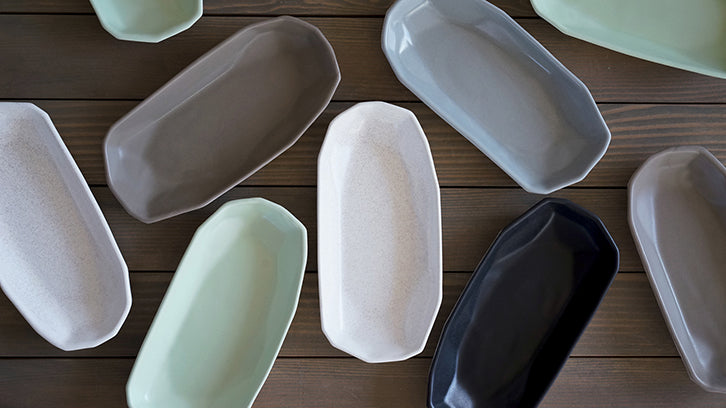
Corbé was founded in the rural community of Orcas Island, Washington in 2012, the love child of a career ceramic artist and a creative chameleon. It’s a small business born, as many are, out of a passion for a craft, but also a desire to create something together. For Ryan, this business was a no-brainer:
“This is all I've ever done. I went to school for it, got my masters in it, and have been working in ceramics studios since I was 18. It's really what I've always wanted to do.”
For Kaitlyn, her eclectic creative resume – graphic design, fine arts, marketing, and retail – was the perfect complement to Ryan’s own. Their success in balancing their personal and professional relationship has depended on filling each other’s gaps, she says (and not talking about business until after their morning coffee).
“I'm more detail oriented and OCD about organizing and workflow, while Ryan is always keeping the business moving forward, working really hard on projects and seeing them through. Sometimes we butt heads but usually it helps push everything along.”
In 2013, the couple poured their efforts into a Kickstarter campaign to scale their business and complete the full set of the The Fifty United Plates – dishes cast in the shape of each US state – designed to hold the foods unique to each region or to come together as an impressive statement piece: an 8-foot ode to made-in-America.
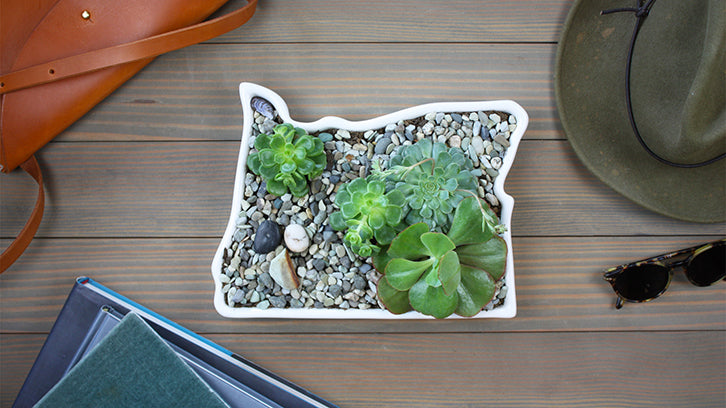
Oregon State Plate
They exceeded their goal in the first 18 hours, and quadrupled it by the end of the campaign. While they were delighted with the success, the reality soon set in: 854 backers would need to be rewarded.
The Kickstarter campaign was a severe crash course in operations, customer service, business management, accounting, everything.
Press followed – HGTV, Bon Appetit, Sunset – and so did the pressure to fulfill.
“We sold out pretty quickly after the Sunset article. I remember getting an angry phone call from someone who was like, ‘How dare you be in Sunset if you're not prepared to sell your stuff.’"
Kaitlyn and Ryan have embraced their successes and failures, scaling and optimizing their operations, learning along the way. They’re on their third ecommerce provider now, and finally have a site and system that work. Their initial order fulfillment process was painfully manual. They laugh as they describe printing labels on a “regular printer” – not a label printer – before cutting and taping them to each box by hand. “The whole process, out the door was like 32 different steps,” Ryan tells me.
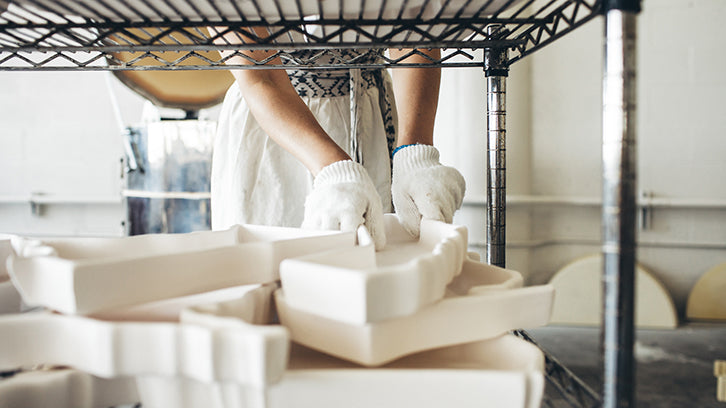
Now they’re streamlining production, too. They’ll never compromise their by-hand ethos, believing that as creators they will always touch the clay and remain deeply involved of all aspects of the business. To scale, though, they know that something has to give.
“Everything we do is in-house and we want to keep it that way. We have the capacity to do it if we automate some things. We hand-make every single one of these plates – it's still casting. Last time we counted, there were 14 different steps. But there's a way that we can make them with a touch of hand but produce them in larger quantities. It would reduce our costs and increase our margins.”
We’re open to fulfillment and distribution but we don't want someone else making our work and then putting our stamp on it.
The solution? They’re bringing young artists in-house. And what better place to do so than a city that is attracting and educating creatives, and thirsty for employment opportunities.
Rebuilding, Brick by Brick
In New Center, just a stone's throw from Detroit’s Woodward Ave, sits the massive studio building that Corbé now owns. Exposed studs reveal progress – plans to expand into brick and mortar, encouraged by a neighbourhood with foot-traffic in its future. Kaitlyn and Ryan realize that they are fortunate to be part of the positive change currently happening around them. For her, the city she knew as a kid as “a place to watch sporting events” has transformed beyond her belief. She calls it “approachable” now.
Development pushes forward around them, in the humble way of a city still scarred by its past failures. Big business and government drive large building and transportation projects, but the city is leaning heavily on community and small business to do it right this time. And Ryan thinks their money is on the right horse:
“When people talk of the resurgence of Detroit, a lot of minds go to Dan Gilbert or the Ilitch Family – big money that creates large developments and gentrifies zones, but it's the small businesses that are really driving the spirit and energy of Detroit. The people who run these businesses are cleaning up buildings and putting them back to use rather than razing them to the ground to make way for new construction.”
It's the small businesses that are really driving the spirit and energy of Detroit.
I asked Diana Russell for her perspective. She's the co-founder of Rebel Nell, a business inspired by the love and collective drive of Detroit’s citizens to propel the city forward. Rebel Nell is a maker business providing employment to disadvantaged women in the community. Diana sees a bright future:
“There have been dramatic changes over the last few years. Neighborhoods within the city have evolved, sprouting world-class restaurants and retail, new employers have moved into the city, and initial steps have been laid for a new mass-transit system, helping people of all walks of life access corners of the community, making it easier for people to get and maintain employment.”

Because of the upswing, now is the time to strike for entrepreneurs. Real estate is still accessible (though climbing) and the city’s business community is a tight network of people helping each other build together. “Do your research and talk to other like-minded businesses,” she offers as advice to those considering setting up shop in Detroit.
However, it’s not necessarily that simple, she says, for a large segment of Detroit’s population:
“Detroit is a city that continues to face significant struggles: under-education, underemployment, poverty. While new businesses and opportunities are being developed, they are typically for those already qualified to capitalize on those opportunities. Entrepreneurship still requires access: access to capital, access to education, access to information. Not everyone has that access. It's the responsibility of the community to help the rest of the community find and get that access. One small victory at a time can help revolutionize the employment landscape in a city like Detroit.”

photo: The Alley Project (TAP), via Rebel Nell
Detroit Hustles Harder
If any community can rally, it’s this one, with a heart unlike any I’ve seen. An unshakable pride, even at the worst of times. Though there are many years of recovery ahead, the “in this together” spirit is healing. Small businesses are finding strength in togetherness.
June & December is a paper and design shop run by Detroit natives Nick and Katie. They’ll be partnering with Corbé and other local designers at New York Now, Nick tells me:
“We're all coming together to try and establish a presence at the show and all get one boost together in saying, ‘We're Detroit makers, made in Detroit’. We're really focused on trying to bring some positive news back about the city. There’s a lot of camaraderie here – collective workspaces that have been set up where makers can have a small space and work together even if they work in different mediums.”

June & December Michigan pride stationery
Kaitlyn and Ryan have similarly embraced the community – they’ve found themselves part of a still-forming collective of like-minded business owners.
“We've gotten to know a number of people over the past year. Our group is growing a little bit more and we're all companies at about the same stage. In the last meeting there were 15 different companies, many structured a lot like ours, a lot of husband and wife teams. It seems like everyone's really open to helping each other and sharing contacts. We always have great conversations about revealing strategies and numbers. There's a lot of transparency."
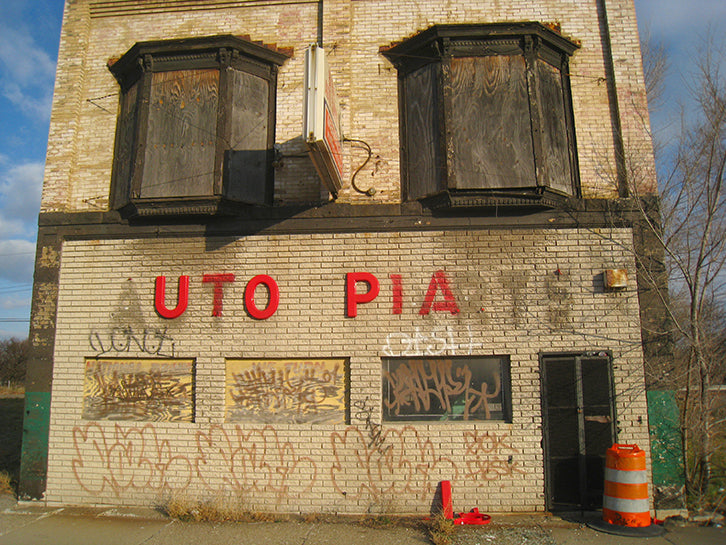
photo: Flickr
“It is literally an offering of blood, sweat, and tears to get new ventures and lives off the ground. But, as they say, Detroit hustles harder, and I'm really honored to keep the company of these folk to see what drive and determination will bring. Where once the city was built and prospered as a manufacturing hub, the future of Detroit is as the center for handufacturing in America.”
It is literally an offering of blood, sweat, and tears to get new ventures and lives off the ground.
Motor City is on its way to becoming a model for other areas of the country dependent on closing plants and dying industries. As it sheds its scaly exterior, the skin it exposes is raw, but glowing with unblemished promise. The opportunity for ownership, and starting (or starting over) is now.
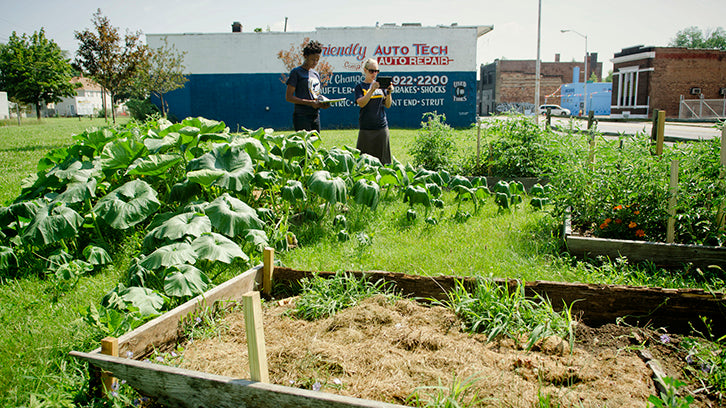
Photo: A Detroit Urban Garden, University of Michigan, via Flickr
Business & Community Resources for Detroit Entrepreneurs:
Build Institute – entrepreneurship training and loans
ProsperUS – empowering entrepreneurs and community partners to transform low-income neighborhood economies from within, scholarships and training
Detroit Entrepreneurship Network – youth entrepreneurship programs and mentorship
Hatch – funding, exposure, education, and mentoring for small biz
Bamboo Detroit – co-working space
DC3 – creative industries advocacy, business bootcamps for creatives
Motor City Match – matching buildings and businesses, providing grants
Detroit Economic Growth Corporation (DEGC) – REVOLVE Detroit project
Detroit Development Fund – loans for small businesses to build in and help revitalize economically distressed areas
Michigan Women’s Foundation – loans, education, and entrepreneurship training for women
Opportunity Resource Fund – funding to small businesses that contribute to the social good of the community, including providing employment to disadvantaged people
ACCESS – business training and coaching, Immigrant Entrepreneur Support Program

Free Video Series: Ecommerce Inspiration
Feeling uninspired? Watch some of the world's most successful entrepreneurs share their best advice for new business owners.
Get our Ecommerce Inspiration video series delivered right to your inbox.
Almost there: please enter your email below to gain instant access.
We'll also send you updates on new educational guides and success stories from the Shopify newsletter. We hate SPAM and promise to keep your email address safe.

